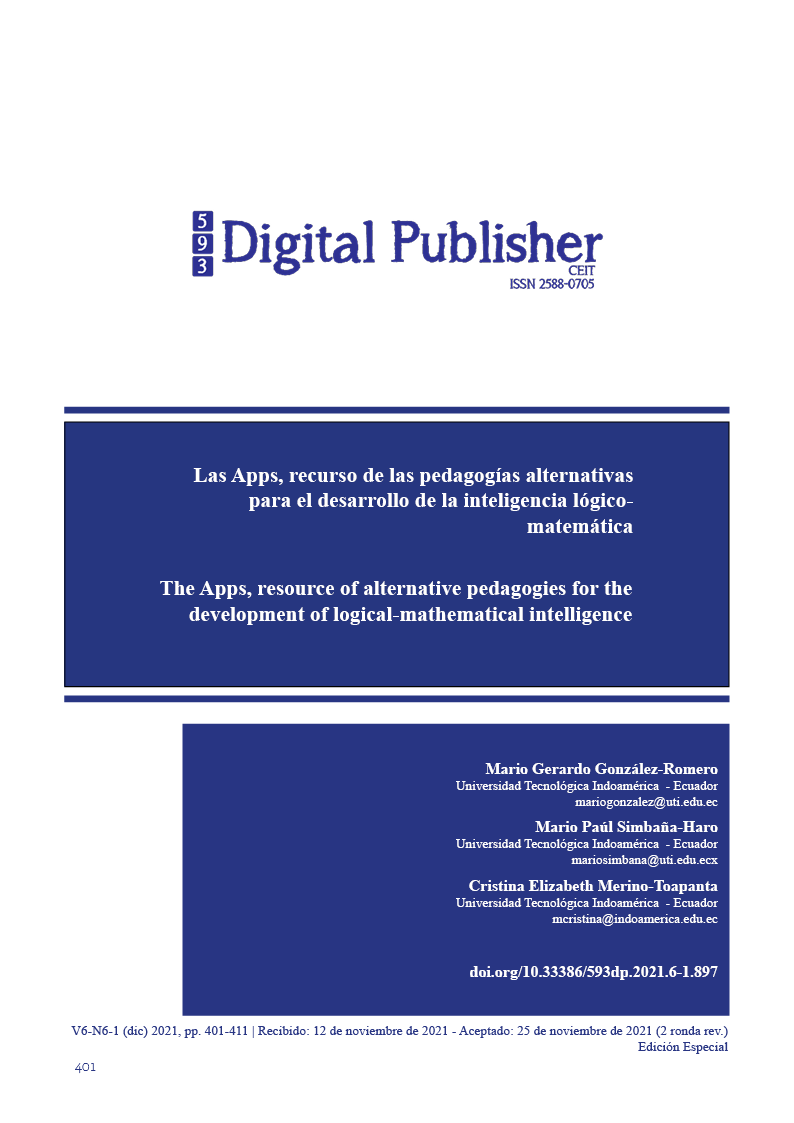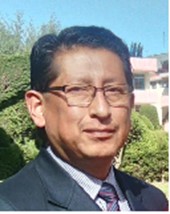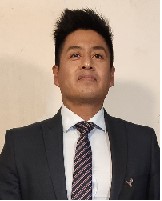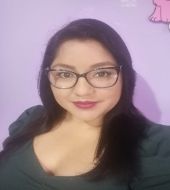The apps, resource of alternative pedagogies for the development of logical-mathematical intelligence
Main Article Content
Abstract
Technology has become a key resource in the innovation of various processes and areas, thus in education it has allowed pedagogical alternatives and the promotion of learning; However, not all students have easy access to technology and with it to significant knowledge, which the management of these implies, hence the establishment of ICTs in the teaching-learning processes are of great contribution, being a fundamental tool for its achievement the use of mobile applications (Apps). In this sense, this research seeks to determine the contribution of mobile applications to the development of logical-mathematical intelligence; for which a qualitative research has been carried out through the description and analysis of the bibliographies found on the subject in question. In this research, alternative pedagogies are observed as one of the greatest challenges of the 21st century, every day new forms of knowledge transmission appear, where children develop their intelligences according to their abilities, being logical mathematical reasoning one of the main areas, those that can be promoted through mobile electronic learning (m-learning), whose impact has been shown to be positive in the teaching-learning process. In this sense, the authors consider that the present investigation opens the door to new investigations that seek to verify the impact of the use of mobile applications through field studies in educational institutions.
Downloads
Article Details

This work is licensed under a Creative Commons Attribution-NonCommercial-ShareAlike 4.0 International License.
1. Derechos de autor
Las obras que se publican en 593 Digital Publisher CEIT están sujetas a los siguientes términos:
1.1. 593 Digital Publisher CEIT, conserva los derechos patrimoniales (copyright) de las obras publicadas, favorece y permite la reutilización de las mismas bajo la licencia Licencia Creative Commons 4.0 de Reconocimiento-NoComercial-CompartirIgual 4.0, por lo cual se pueden copiar, usar, difundir, transmitir y exponer públicamente, siempre que:
1.1.a. Se cite la autoría y fuente original de su publicación (revista, editorial, URL).
1.1.b. No se usen para fines comerciales u onerosos.
1.1.c. Se mencione la existencia y especificaciones de esta licencia de uso.
References
Aguado, J. M., Martínez, I., & Cañete, L. (2015). Tendencias Evolutivas del Contenido Digital en Aplicaciones Móviles. http://eprints.rclis.org/30299/1/10.pdf: eprints.
Ascheri, M., Testa, O., Pizarro, R., Camiletti, P., Diaz, L., & Marino, S. (2015). Desarrollo de aplicaciones para la enseñanza de la matemática con dispositivos móviles. Jornadas de Enseñanza e Investigación Educativa en el campo de las Ciencias Exactas y Naturales (pág. s/p). La Plata: Universidad Nacional de La Plata. Obtenido de http://sedici.unlp.edu.ar/bitstream/handle/10915/58800/Documento_completo.pdf-PDFA.pdf?sequence=1&isAllowed=y: sedici.
Caicedo, C., Toala, M., Murillo, L., Romero, M., Pilay, C., & Figueroa, G. (2020). Aplicación móvil para el fortalecimiento de capacidades lógico-matemáticas. https://www.revistaespacios.com/a20v41n23/a20v41n23p18.pdf: Revista Espacios.
Campión, R. S., Amo Filvá, D., & Díez Ochoa, A. (2014). ¿PUEDEN LAS APLICACIONES EDUCATIVAS DE LOS DISPOSITIVOS MÓVILES AYUDAR AL DESARROLLO DE LAS INTELIGENCIAS MÚLTIPLES? EDUTEC Revista Electrónica de Tecnología Educativa, 1-10. Obtenido de http://edutec.rediris.es/Revelec2/Revelec47/n47_Santiago-Amo-Diez.html
Grisales, A. (2018). Uso de recursos TIC en la enseñanza de las matemáticas: retos y perspectivas. Entramado, 198-214. Obtenido de http://www.scielo.org.co/pdf/entra/v14n2/1900-3803-entra-14-02-198.pdf
Mercadé, A. (s/f). https://materialestic.es/. Obtenido de Transición a la Vida Adulta y Activa: https://materialestic.es/transicion/apuntes/Los.8.tipos.de.inteligencia.segun.Howard.Gardner.pdf
Ministerio de Telecomunicaciones y de la Sociedad de la Información. (2020). Logros de la Revolución Tecnológica en Ecuador, se destacan por el Día Nacional de las Telecomunicaciones. https://www.telecomunicaciones.gob.ec/logros-de-la-revolucion-tecnologica-en-ecuador-se-destacan-por-el-dia-nacional-de-las-telecomunicaciones-2/.
Navarro Fernández, R., Vega Velarde, M., Chiroque Landayeta, E., & Rivero Panaqué, C. (2018). Percepción de los docentes sobre las buenas prácticas con un aplicativo móvil para la enseñanza de matemáticas. Educación, 81-97. Obtenido de ttps://dx.doi.org/10.18800/educacion.201801.005





